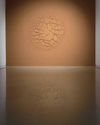
In Julien Segard’s Dark Was The Night, an opaque blackness envelopes a dimly-lit room. Before we adjust to the black, bright slivers akin to the tricks of the eye or a hallucination draw our attention. Flame-like and golden at its tips, descending and disintegrating, this fantastic ‘explosion’ is spellbinding. This is an effect created by the golden foil that spreads across a charcoal curtain in the room.
These splinters of light could be a shower of meteors hurtling through the atmosphere or a dry branch set ablaze, its embers slowly dissolving into ash. It could also be pyrotechnic on a moonless night or a vision of distant combustion.
Segard’s monumental Dark Was The Night made of charcoal and gold foil on the cloth was part of Four Positions, an anthology of four solo projects featuring works by Ayesha Sultana, Krishna Reddy, Rathin Barman, and Segard. The show was held at Experimenter, Kolkata, from the 22nd of August to the 30th of September.
Light and darkness in Segard’s work are observational. They stretch from the nimbleness of a shadow to the weight of the night sky. Segard harnessed this darkness by venturing into nooks, dead spaces and trespassing into the underbelly; he juxtaposed it against the wideness of the horizon. Dark Was The Night is a departure from distinguishing darkness from light. It, instead, proposes that they are both the same or darkness is disguised as light. In many ways, it represents our realities and fictions. Like a magician’s trick, it holds our rapt attention whilst everything collapses around us. The fantastical flare-up is not possible without and is reliant on the very darkness it sets out to mask.
Bu hikaye Art India dergisinin December 2020 sayısından alınmıştır.
Start your 7-day Magzter GOLD free trial to access thousands of curated premium stories, and 9,000+ magazines and newspapers.
Already a subscriber ? Giriş Yap
Bu hikaye Art India dergisinin December 2020 sayısından alınmıştır.
Start your 7-day Magzter GOLD free trial to access thousands of curated premium stories, and 9,000+ magazines and newspapers.
Already a subscriber? Giriş Yap

Parts, Wholes And The Spaces In Between
Sonal Sundararajan introduces Samira Rathod's free-spirited and rebellious explorations in the world of architecture, furniture and design.

"The Fine Art of Going to the Pictures."
Dr. Banerjee in Dr. Kulkarni's Nursing Home at Chemould Prescott Road brings together 26 paintings featuring a series of dramatic scenes from Hindi and Bengali films. In conversation with Abhay Sardesai, artist Atul Dodiya talks about childhood trips to movie halls, painted figures gripped by tension, and the closeness and remoteness of cinematic images.

"To Finally Have Something of Your Own to Mine."
Dayanita Singh is the recipient of the coveted 2022 Hasselblad Award. Keeping the photograph at the centre, she speaks to Shreevatsa Nevatia about books, book objects, photo novels, exhibitions and museums.

OF DIVINE LOSS
Shaurya Kumar explores the relationship between the subject and object of devotion, finds Aranya.

THE PAST AND ITS SHADOWS
Neha Mitra visits two shows and three artists in Mumbai.

FORCE OF NATURE
Alwar Balasubramaniam dwells on absences and ephemeralities in his new work, states Meera Menezes.

SHAPES OF WATER
Devika Sundar's works delineate the murky, malleable boundaries between the human body and the organic world, says Joshua Muyiwa.

INTIMATIONS OF INTIMACY
Sunil Gupta shares his journey with Gautami Reddy.

THE FRACTURED PROSPECT
Nocturnal landscapes as ruins in the making? Adwait Singh looks at Biraaj Dodiya's scenes of loss.

TEETERING BEYOND OUR GRASP
Meera Menezes traces Mahesh Baliga's journey from Moodabidri to London.